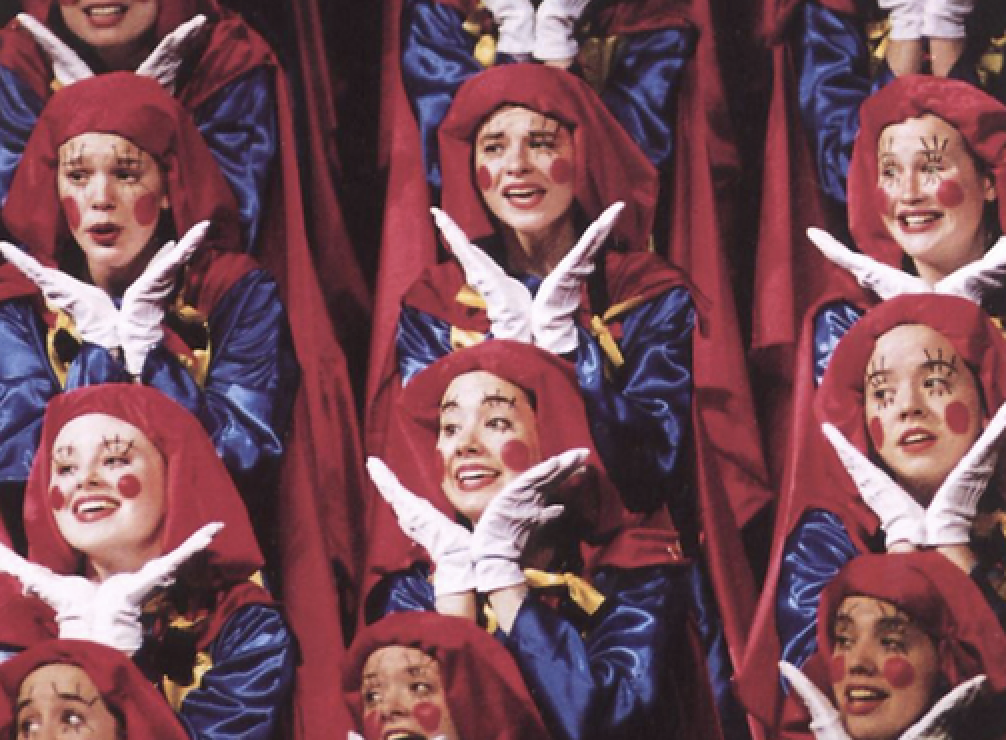On Valentine’s day of 1957, the campus made history by hosting the first-ever campus-wide Sing Song. That year, with 23 participating groups, a sold-out production took place in Sewell Auditorium with no judging criteria or overall categories, and Galaxy took the first-ever Sing Song win.
Current and recent former directors of Sing Song said the challenge has always been adapting to change while remaining true to the show’s history.
Sing Song was created by Dr. Bob Hunter, now vice president emeritus, after he researched other colleges like Baylor University that had started their own traditions, like “Sing.” Courtney McGaha, director of student productions, said at that time, ACU was already considered “the singing college” because of its Church of Christ affiliation and a cappella worship services.
“Back in the ‘50s, ACU had a reputation for being ‘the sing- ing college,’” McGaha said. “Dr. Bob Hunter started the idea of a singing competition. In November of 1956, Dr. Bob Hunter ran with the idea of a singing contest on campus.”
Sing Song continued to grow, adding more categories, clubs and class acts.
The senior class of 1959 was the first class act to win overall, alongside the GATA act in the social club category.
From starting off with the tradition of singing songs that were more than just worship songs to creating dance moves, themes and iconic club traditions, Sing Song is a tradition that everyone knows and loves.
Traditions of Sing Song continue on within modern club acts with iconic moves that each club have labeled their own, like “the Big GATA” or “the Siggie Star.”
In 1984, Lucille Ball even showed love for the show after the sophomore class performed an I Love Lucy-themed act and went on to win overall.
Along with McGaha, Tom Craig and Nick Tatum, many others teamed up to make the archives for Sing Song in 2018.
Creating the archives gave Office of Student Productions a way to share the history and tradition of Sing Song in an easy and efficient way.
“For me in my position, I made the archives, being able to see the progression of the student body and what they produce,” McGaha said. “You can tell a lot on how a club is doing based on their Sing Song act, and you can tell a lot about how the student body is doing with the class acts.”
While the archives are used as a time machine for most, McGaha used the archives to her advantage for the clubs to make their themes.
“When we first started the archives, we had each act pick a theme from before the 2000s and redo it,” McGaha said.
“It was kind of fun to give the shared experience of people in the original acts.”
McGaha said Sing Song is the most sold out event on campus. Homecoming does not compare to the alumni attendance like Sing Song does, she said.
“Seeing the alumni excited about Sing Song and having them see the students be excited for it still,” McGaha said. “Having the access to the archives and history is connecting clubs and acts to alumni.”
Before McGaha, Craig and Tatum filled her shoes as directors of student productions. Craig, though no longer involved in the show, always comes back to Sing Song because of the tradition.
“Sing Song has iconic elements that continue no matter how the show itself evolves,” Craig said. “That’s rooted in our a cappella singing heritage. That element creates a dynamic that students can immerse themselves in for a truly unique experience.”
Due to COVID-19, Sing Song was unable to return until 2021 with a limited performance from all acts.
This year, Sing Song is returning to a more normal attendance and participation, although numbers are still lower than what they usually are.
History is what makes Sing Song, according to Tatum.
“What makes Sing Song such a cool thing is that it has been around for so long,” Tatum said. “And the audience loves it because they remember doing it. Sing Song wouldn’t be fun for students if people didn’t come and weren’t excited about it. The fact that we have a rich history is what makes it what it is today. Without our history, we would be nothing.”
With a different location this year, Sing Song’s history and tradition continues while acts continue to evolve. Sing Song will never be the same as when it began; however, Sing Song will always go back to its roots, Tatum said.
“Sing Song would be boring if it was always the same,” Tatum said. “We constantly need to be improving the show to make it more modern. But what makes Sing Song, Sing Song is the tradition. We are always walking this balance of improvement and positive change but staying true to our roots.”

